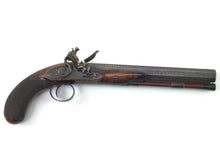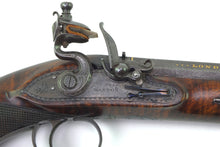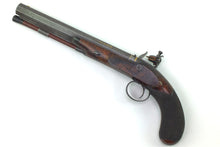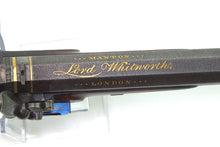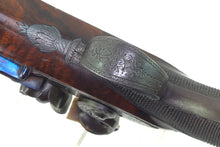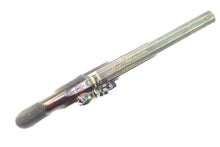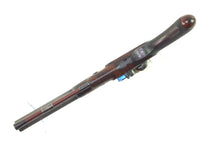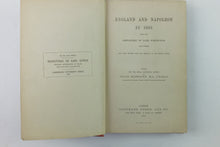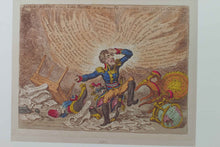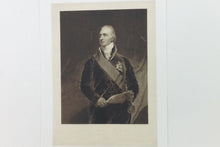
A Very Fine Flintlock Duelling Pistol by John Manton.
Missed out on this item? Click to view all current Antique Pistols & Revolvers. Free UK delivery on all items
15 ½” overall, 10” octagonal barrels in 25 bore, signed in gold ‘Manton London’ on the sides of the barrel and the owners name ‘Lord Whitworth’ on the top flat. Hook breech with gold line, blade fore sight and rear sight, numbered 3616 on underside of barrel. Lock border, swan cock and frizzens all engraved with wheat ears, waterproof pan, roller on toe of frizzen. Steel trigger guards engraved with trophy of arms and the number 3618 and pineapple finial. Figured walnut half stock with horn fore-end, chequered butt and horn tipped ramrod.
Numbered 3616 for 1801.
In very good condition
Charles Whitworth, 1st Earl Whitworth, GCB, PC, known as The Lord Whitworth between 1800 and 1813 and as The Viscount Whitworth between 1813 and 1815, was a British diplomat and politician. British Ambassador to Pairs during the Peace of Amiens,1802-3,
Sold with a copy of his dispatches from Paris and two prints
In Maniac-Ravings—or—Little Boney in a strong Fit (1803), James Gillray caricatured Napoleon's tirade to Whitworth at the Tuileries on 13 March 1803.
Charles Whitworth, 1st Earl Whitworth by John Henry Robinson, after Sir Thomas Lawrence
Notes: The Treaty of Amiens was concluded on 27 March 1802, and Whitworth, whose means were now fully adequate to the situation, was chosen to fill the important post of ambassador at Paris. His instructions were dated 10 September 1802, and two months later he set out with a large train, being received at Calais with enthusiasm; a considerable period had elapsed since a British ambassador had been seen in France. He was presented to Napoleon and Mme. Bonaparte on 7 December, and six days later his wife was received at St Cloud. The duchess, whose hauteur was very pronounced, had considerable scruples about calling upon the wife of Talleyrand. As early as 23 December Whitworth mentions in a despatch the rumour that the first consul was meditating a divorce from his wife and the assumption of the imperial title, but during his first two months' sojourn in Paris there seemed a tacit agreement to avoid disagreeable subjects. Napoleon ignored the attacks of the English press, the retention of Malta, and the protracted evacuation of Egypt while England kept silence as to the recent French aggressions in Holland, Piedmont, Elba, Parma, and Switzerland.
The British government was, however, obstinate in its refusal to quit Malta until a guarantee had been signed by the various powers ensuring the possession of the island to the knights of St. John. This difficulty, which constituted the darkest cloud on the diplomatic horizon, was first raised by Talleyrand on 27 January 1803. Three days later was published a report filling eight pages of the Moniteur from Colonel Sebastiani, who had been sent by Napoleon upon a special mission of inquiry to Egypt. In this report military information was freely interspersed with remarks disparaging to England, in which country the document was plausibly interpreted as a preface to a second invasion of Egypt by the French. The Addington ministry consequently instructed Whitworth, through the foreign minister Hawkesbury, to stiffen his back against any demand for the prompt evacuation of Malta. On 18 Feb Napoleon summoned the ambassador, and, after a stormy outburst of rhetoric, concluded with the memorable appeal, "Unissons-nous plutôt que de nous combattre, et nous réglerons ensemble les destinées du monde." Any significance that this offer might have had was more than neutralised by the first consul's observation, "Ce sont des bagatelles" (much commented upon in England), when, in answer to reproaches about Malta, Whitworth hinted at the augmentation of French power in Piedmont, Switzerland, and elsewhere.
The crisis, of extreme importance in the career of Napoleon ("il était arrivé," says Lanfrey, "à l'instant le plus critique de sa carrière") as well as in the history of England, was arrived at on 13 March 1803, the date of the famous scene between Napoleon and the British ambassador at the Tuileries. At the close of a violent tirade before a full court, interrupted by asides to foreign diplomatists expressive of the bad faith of the British, Napoleon exclaimed loudly to Whitworth, "Malheur à ceux qui ne respectent pas les traités. Ils en seront responsables à toute l'Europe." ("Woe to those who do not respect treaties! They will be responsible to all Europe.") "He was too agitated," says the ambassador, "to prolong the conversation; I therefore made no answer, and he retired to his apartment repeating the last phrase." Two hundred people heard this conversation ("if such it can be called"), "and I am persuaded," adds Whitworth, "that there was not a single person who did not feel the extreme impropriety of his conduct and the total want of dignity as well as of decency on the occasion." The interview was not, however, a final one (as has often erroneously been stated). Whitworth was received by the first consul once again on 4 April, when the corps diplomatique were kept waiting for an audience for four hours while Napoleon inspected knapsacks. "When that ceremony was performed he received us, and I had every reason to be satisfied with his manner towards me" (Whitworth to Hawkesbury, 4 April 1803). Napoleon wished to temporise until his preparations were a little more advanced, but the pourparlers henceforth had little real significance. On 1 May an indisposition prevented the ambassador from attending the reception at the Tuileries, on 12 May he demanded his passports, and on 18 May Britain declared war against France. Whitworth reached London on 20 May, having encountered the French ambassador, Andreossy, three days earlier at Dover. Throughout the trying scenes with the first consul, his demeanour was generally admitted to have been marked by a dignity and an impassibilité worthy of the best traditions of aristocratic diplomacy.
Irritated by his failure to stun him by a display of violence (such as that which had so daunted the Venetian plenipotentiaries before the treaty of Campo Formio, Napoleon did not hesitate to suggest in one of his journals that Whitworth had been privy to the murder of Paul I in Russia. At St. Helena in July 1817 he alluded to him with calmness as "habile" and "adroit", but he always maintained that the accepted version of the celebrated interview of 13 March was "plein des faussetés".










